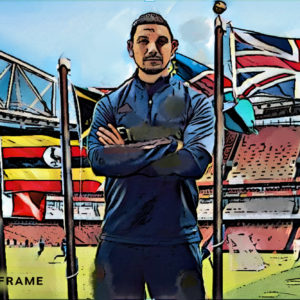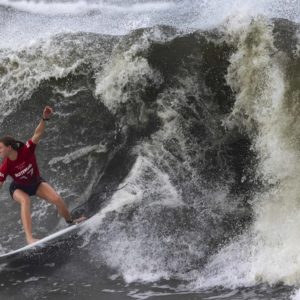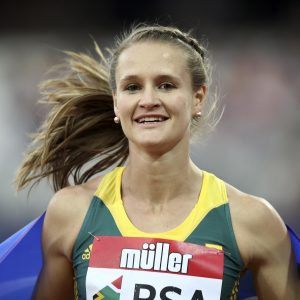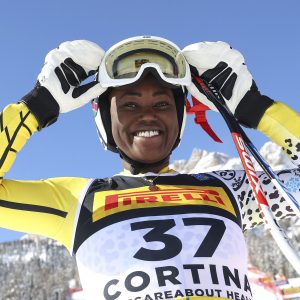Liberia surfs wave of optimism in Robertsport
The Liberian Surf Club has grown from its humble beginnings into an organisation on the crest of producing world-class surfers, all while keeping community at its heart.
Author:
21 February 2022

Robertsport has offered its people a place of refuge, after enduring a bloody civil war and an Ebola epidemic. The small fishing town northwest of Liberia’s capital city of Monrovia has done this through surfing. Its scenic views and renowned waves have seen it become the epicentre of an emerging surfing culture.
“When I first saw surfing, it looked like magic and I wanted to be a part of it,” says Alphanso Appleton, a photographer and co-founder of the Liberian Surf Club. “I was comfortable when I got in the water and when I stood on the surfboard for the first time, it resonated well with me. I just kept on doing it every day and I was on the beach all the time learning and practising.
“It was fun and I can say for myself, it helped me with my past traumas. It gave me an opportunity to get away from the tragedy that came with the civil war and it gave me an outlet to find healing. It promotes positivity among us and it allowed me to grow as a person, and I used it as a tool to serve my community.”
Related article:
In the early 2000s, after the Second Liberian Civil War, the country saw an uptick in tourists. Robertsport’s inviting coastline and its “seclusion from everything”, as Appleton puts it, attracted surfers from all over the world looking to find the perfect wave. For the sport to grow in the region though, Appleton and company had to use their initiative.
“Surfing can be an expensive sport, so getting access to surfboards, fins and leashes in West Africa is difficult. With travelling surfers coming into Robertsport, we started to have access to surfboards and surf materials. We set up a trade where we would take travelling surfers around town and show them the best spots and in return, they would leave their surfboards behind. And we would share the boards among each other. One would go for an hour and then come out, and another person would go in after. We tried to be resourceful and make it work.”
Comfortable in the water
Appleton estimates that when he started surfing, there were about eight to 10 surfers. That number doubled in 2008, when he co-founded the club. “Surfing is a fun hobby. As kids of fishermen, we were close to the water and so we were comfortable in it. It was something that we really loved and we enjoyed doing it,” says Appleton.
As interest grew, more people wanted to be involved. “Being one of the first-generation surfers, we decided to start a surf club. It was the first of its kind.” The founders wanted to create a safe environment for young people and create opportunities in the sport.
But as interest in surfing grew, there were fewer resources to go around. To make it more accessible, Appleton co-founded the Liberian Surf Association (LSA) with Benjamin McCrumada in 2010. There were about 60 to 75 surfers by 2013 and participation in the sport is now at an all-time high, with around 200.
“The goal of the association was to oversee all the surfing-related activity within the country, and to start running competitions and create scholarships, do something that the local community could benefit from. The purpose was to mentor young kids and find a way to help the community by creating more jobs,” says Appleton.
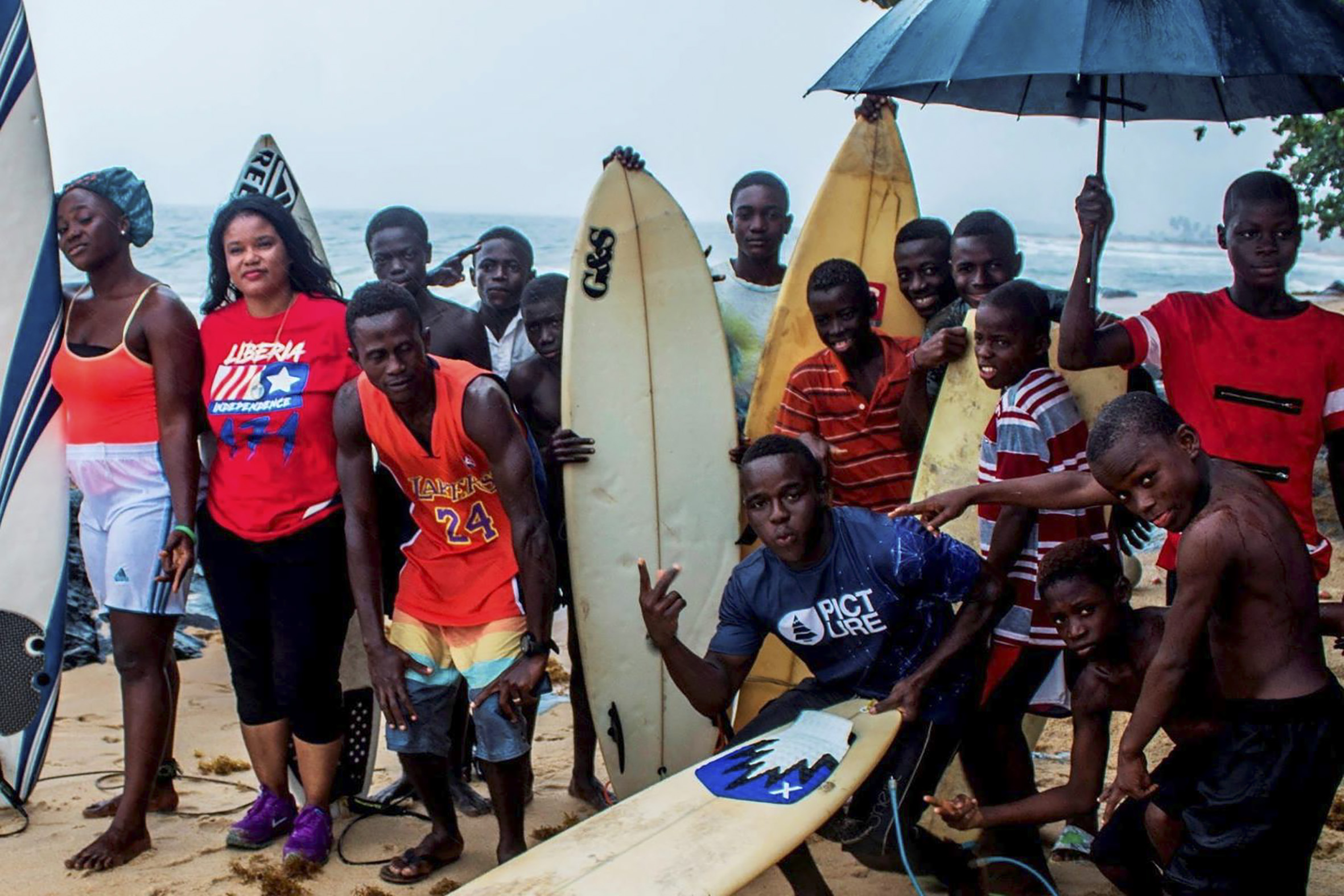
The creation of the LSA coincided with growing ecotourism in Robertsport. The Kwepunha Surf Retreat, owned by Americans Daniel Hopkins and Sean Brody, helped attract international visitors to the coast as well as provide jobs for residents.
More recently, the Liberian Surf Club has acquired land to develop property in partnership with the Universal Outreach Foundation (UOF), a humanitarian organisation. Once up and running, four hospitality students sponsored by the organisation are to manage the surf retreat. The UOF’s role extends to helping with capital costs for construction. This project will create even more job opportunities for residents.
“Surfing is a massive tourist draw for Robertsport,” says UOF executive director Kent Bubbs Jr. “People know of its good quality waves all around the world. The surf club had a vision and we’re kind of the conduit to help them reach that.” He first travelled to Liberia in 2008 as a tourist and then stayed to work under his father’s foundation, building schools and establishing an economic development programme with a focus on beekeeping, coconut oil and other small business projects.
“There are so many surf communities that end up losing because they don’t think ahead, and then all the land gets bought up by developers who put up fake hotels,” says Bubbs. The UOF worked with the surf club to get it registered as a corporation and legally compliant. It also raised funds for a surf campground with a restaurant, where the club could offer surfing lessons, snorkelling or hiking tours and rentals.
Open to all
The surfing community in Robertsport operates under an open-door policy; it is for any and all who want to participate, particularly women and girls. The men who built up the sport are welcoming and have created a space where women feel safe and can thrive.
“I started surfing with the guys and I was myself,” says Esther Teah, one of the many women who are actively involved in the sport. “They encourage me to do better.”
Irene George, another frequent figure on Robertsport’s shores, adds: “I got involved in surfing when I was small. I saw other guys doing it and it was amazing, and I said to myself that I would be a part of this sport. So I tried and now my life is better because I am a surfer.”
An important step in the development of the sport was to get the LSA accredited and incorporated into the International Surfing Association (ISA). This allowed Liberia to qualify for and host surfing competitions, and the LSA now organises several tournaments. The annual Robertsport Surf National Competition has been running for eight years and attracted more than 50 competitors last year, including surfers from neighbouring Sierra Leone.
Related article:
With a more formal structure, the Liberian Surf Club has been able to secure 16 scholarships for surfers in Liberia. It also received funds from the ISA for more surfboards, while companies like Provide the Slide have a programme to donate surfboards to Robertsport as well as neighbouring surfing communities. It donated 36 boards in 2020 and aims to deliver about 40 boards this year to the surf club, 10 to a community in Ivory Coast and around 20 to the Bureh Beach surfers in Sierra Leone.
The organisations involved in Robertsport’s surfing ecosystem also promote education and skills development. Surfers who join the club must be in school and are encouraged to learn a trade. For the children who can’t afford school, there are scholarships available for fees and books. Some of the surfers are put in training programmes where they gain expertise in the surfing industry, be it tourism, hospitality, repairs or lifeguarding.
“We are trying to get the ISA to come to Liberia and put on surf instructor courses, and train about 20 instructors in Liberia and get them certified under the ISA certification,” says Bubbs. “We’d like to get a group of kids trained in lifeguarding. There’s a competition in Egypt and we want to get some of the surfers there, so they can get some exposure and have a skill they can use to make income.”
Overcoming Ebola
The Ebola outbreak that first hit in 2014 threatened the strides surfing had made over the previous decade. Liberia was the hardest-hit country, registering 4 810 deaths out of 10 678 confirmed cases, according to the 2019 Pan African Medical Journal.
“Robertsport was emerging with a strong tourism sector, and there were a lot of businesses benefitting from tourists coming in and new jobs were being created. And then everything got shut down. There wasn’t any cargo or people coming in, so we had limited access to materials and equipment. I was out of a job. We were all out of jobs and that affected the economy. It made everything hard and it was difficult,” says Appleton.
Related article:
Liberia was first declared Ebola-free in March 2015, but the virus was reintroduced three times in nine months. The World Health Organization officially declared the country free of Ebola in June 2016, signalling the end of the epidemic. “We’re still in the process of recovering. Things are gradual but I definitely think we’re heading in the right direction,” says Appleton.
“The good thing about surfing is that the waves are always going to be there. Even with the limited amount of equipment, we still shared and we were still surfing. It’s part of the community and it is a part of our lives.”
Worldwide waves
The next step is for Liberia to become competitive on the world stage, and surfers are being encouraged to participate in events in North and West Africa. Some have travelled to Sierra Leone and Ghana for competitions and Appleton worked with a surf team in Ghana at one point.
Alfred Lomax is the most decorated surfer from Liberia. He has competed in Ghana and Ivory Coast, and his path offers a window to the possibilities for the culture to spread outside Liberia.
“As an association, we have not reached a point yet where we have the funding and the support to be able to travel and compete as a country. The sport is still growing and it’s fairly new. It will take a couple of years to have a team that can compete on an international level. We are definitely working on that and we have collaborated with the government to promote the sport,” says Apleton.
Related article:
Bubbs is optimistic and would love to see a Liberian surfer competing in Paris in 2024. “I’d like to see more support from the government and for them to plan for the Olympics. We have some surfers here that are really good and by the time the next Olympics come around, they’ll be able to compete. We are doing all we can to get it on a positive trajectory.”
Liberia’s surfers are on board with this vision. Brahema Gross, one of the bright stars in the surfing scene, is excited about the possibilities. “My dream is to compete and represent my country and my organisation, hopefully in the next five to 10 years. We are all up-and-coming surfers and we have plans for the future. We expect to build surfing in Liberia, so more people can join and the sport can grow.”

